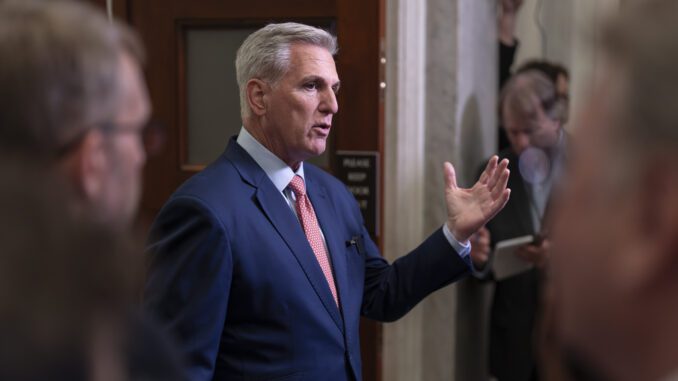
WASHINGTON, D.C. — Lawmakers broke for their August recess with work on funding the government largely incomplete, fueling worries about whether Congress will be able to avoid a partial government shutdown this fall.
Congress has until Oct. 1, the start of the new fiscal year, to act on government funding. They could pass spending bills to fund government agencies into next year, or simply pass a stopgap measure that keeps agencies running until they strike a longer-term agreement. No matter which route they take, it won’t be easy.
“We’re going to scare the hell out of the American people before we get this done,” said Sen. Chris Coons, D-Del.
Coons’ assessment is widely shared in Congress, reflecting the gulf between the Republican-led House and the Democratic-led Senate, which are charting vastly different — and mostly incompatible — paths on spending.
The Senate is adhering mostly to the top-line spending levels that President Joe Biden negotiated with House Republicans in late May as part of the debt-ceiling deal that extended the government’s borrowing authority and avoided an economically devastating default.
That agreement holds discretionary spending generally flat for the coming year while allowing increases for military and veterans accounts. On top of that, the Senate is looking to add $13.7 billion in additional emergency appropriations, including $8 billion for defense and $5.7 billion for nondefense.
House Republicans are going a different way.
GOP leaders have teed up bills with far less spending than the agreement allows in an effort to win over members who insist on rolling back spending to fiscal year 2022 levels. They are also adding scores of policy add-ons broadly opposed by Democrats.
At a press conference at the Capitol this past week, some members of the House Freedom Caucus, a conservative faction within the House GOP, said that voters elected a Republican majority in that chamber to rein in government spending and it was time for House Republicans to use every tool available to get the spending cuts they want.
“We should not fear a government shutdown,” said Rep. Bob Good, R-Va. “Most of the American people won’t even miss if the government is shut down temporarily.”
Many House Republicans disagree with that assessment. Rep. Mike Simpson, R-Idaho, called it an oversimplification to say most Americans wouldn’t feel an impact. And he warned Republicans would take the blame for a shutdown.
“We always get blamed for it, no matter what,” Simpson said. “So it’s bad policy, it’s bad politics.”
But the slim five-seat majority Republicans hold amplifies the power that a small group can wield. Even though the debt ceiling agreement passed with a significant majority of both Republicans and Democrats, conservatives opponents were so unhappy in the aftermath that they shut down House votes for a few days, stalling the entire GOP agenda.
Shortly thereafter, McCarthy argued the numbers he negotiated with the White House amounted to a cap and “you can always do less.” GOP Rep. Kay Granger of Texas, who chairs the House Appropriations Committee, followed that she would seek to limit nondefense spending at 2022 budget levels, saying the debt agreement “set a top-line spending cap — a ceiling, not a floor.”
The decision to cut spending below levels in the debt ceiling deal helped get the House moving again, but put them on a collision course with the Senate, where the spending bills hew much closer to the agreement.
“The way to make this work is do it in a bipartisan way like we are doing in the Senate. If you do it in a partisan way, you’re heading to a shutdown. And I am really worried that that’s where the House Republicans are headed,” Senate Majority Leader Chuck Schumer, D-N.Y., told reporters.
McCarthy countered that people had the same doubts about whether House Republicans and the White House could reach an agreement to pass a debt ceiling extension and avoid a default.
“We’ve got ’til Sept. 30. I think we can get this all done,” McCarthy said.
In a subsequent press conference, McCarthy said he had just met with Schumer to talk about the road ahead on an array of bills, including the spending bills.
“I don’t want the government to shut down,” McCarthy said. “I want to find that we can find common ground.”
In all, there are 12 spending bills. The House has passed one so far, and moved others out of committee. The Senate has passed none, though it has advanced all 12 out of committee, something that hasn’t happened since 2018.



